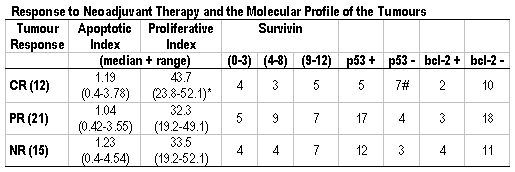# 100092 Abstract ID: 100092 Apoptosis and Proliferation in Esophageal Cancer and Their Role in Determining Response to Neoadjuvant Therapy
Duncan M Beardsmore, Caroline Verbeke, Claire Davies, David J Bowrey, Pierre J Guillou, Geoffrey W Clark, Leeds, UK
Background: Altered expression of the genes that control apoptosis and proliferation may influence how cancer cells respond to radiotherapy and chemotherapeutic agents. The aim of this study was to determine the role of the novel anti-apoptotic and cell-cycle gene, survivin, in apoptotsis and proliferation in esophageal cancer and to evaluate whether survivin, p53 and Bcl-2 status were able to predict a patient's response to neoadjuvant therapy. Methods: 104 esophageal tumours (79 adenocarcinomas and 28 squamous cell carcinomas) were studied. The paraffin embedded material taken from resection specimens and endoscopic biopsies was immunostained for survivin, p53 and bcl-2 proteins. Survivin expresion was graded (0-12) according to the percentage and intensity of stained cancer cells. P53 and bcl-2 expression was classified as positive or negative. Proliferative and apoptotic cells were measured using KI-67 and the TUNEL method respectively. The proliferative and apoptotic indices were expressed as a percentage after counting the number of immunostained cells per 1000 cancer cells. 48 patients whose pre-treatment biopsies were analysed underwent neoadjuvant chemoradiotherapy (40) or chemotherapy (8) followed by surgery. Outcome was graded as a complete response (CR), a partial response (PR) or no response (NR) according to histological examination and CT imaging. Results: Expression of survivin was found to correlate significantly with the proliferative index (Spearman's coefficient = 0.396, p<0.01) but not the apoptotic index. Bcl-2 expression and p53 status were not associated with either apoptotic or proliferative activity. Patients who received neoadjuvant treatment were more likely to receive a CR if their tumours had high proliferative activity (*Kruskall-Wallis, p=0.013) or if they were p53 negative (#Fisher's, p=0.024). Conclusions: Survivin expression appears to foster proliferative activity in esophageal cancer. In addition, this study shows that tumours with a high proliferative index and a functioning p53 gene are responsive to neoadjuvant chemoradiotherapy

|
 500 Cummings Center
500 Cummings Center +1 978-927-8330
+1 978-927-8330
 +1 978-524-0461
+1 978-524-0461